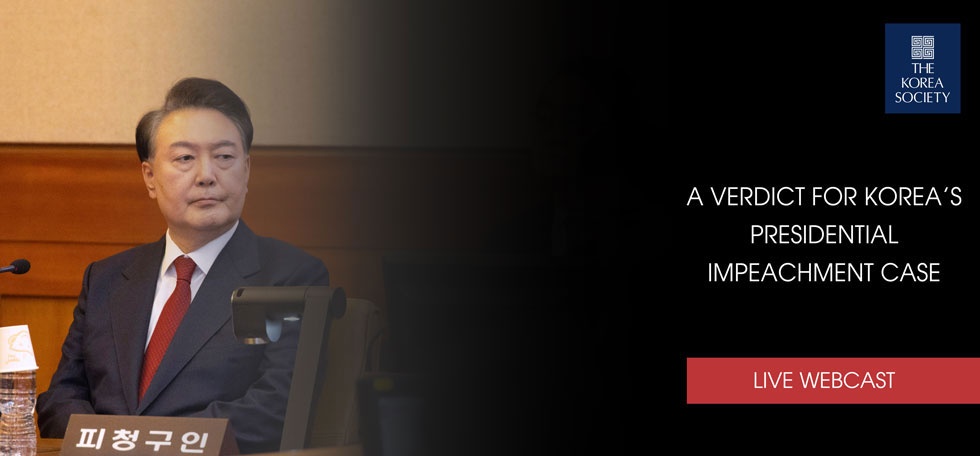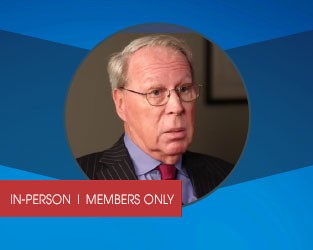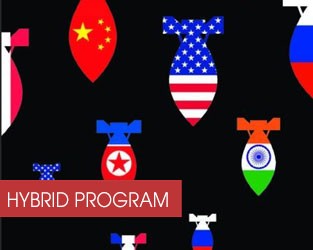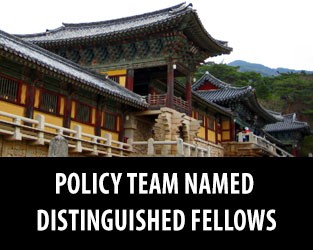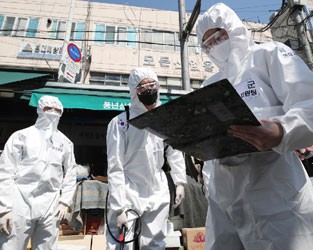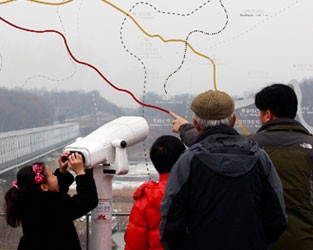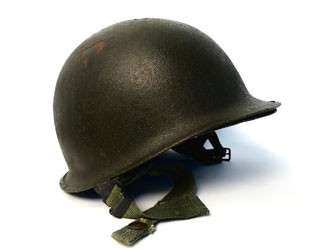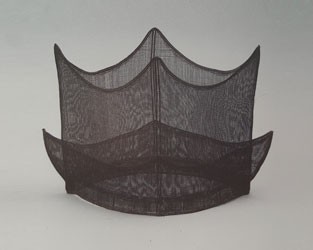February 28, 2013
South Korea’s Presidential Inaugural and Next Steps in Its Relations
Scott Snyder, Council on Foreign Relations
David Straub, Stanford University, Shorenstein Center
John Delury, Yonsei University
In conversation with Dr. Stephen Noerper, The Korea Society
STEPHEN NOERPER: (Moderator)
Welcome to The Korea Society, and welcome to Studio Korea. On February 25, 2013, Park Geun-hye was inaugurated as President of Korea. This was an important day, rich in symbolism. We would like to explore for our studio audience and those streaming online the implications of Park Geun-hye's inaugural and next steps in the relationship between the Republic of Korea and the United States. With us today, both in studio and electronically are three of our nation's most respected Korea analysts. They are Scott Snyder, senior fellow and a director at the Council on Foreign Relations, Stanford University's David Straub, associate director of the Shorenstein Center, and John Delury, assistant professor at Yonsei University. We have a distinguished audience today interested in the Korea-US relationship.
I'd like to begin with an initial take on Park Geun-hye's inaugural. Scott Snyder from the Council on Foreign Relations is with us in studio. Scott, what's your initial take on President Park's inaugural?
SCOTT SNYDER:
I thought that Madame Park did a very good job of laying out her vision for what she hopes to accomplish over the course of the next five years. She tried to lay out a vision for a creative economy, which I think correctly identifies the challenge for Korea as becoming more active in innovation, rather than necessarily being driven by exports. She also talked about Korean spirit and the strength of Korean culture, which was a good thing for the audience in Korea to hear. She didn't talk that much about foreign relations, with the exception of North Korea, but I think that her remarks on North Korea are notable, especially given the relative constraint in the strategic environment that has been created by North Korea's satellite launch and nuclear test. She talked about step-by-step trust building, which has been one of her major themes. The big challenge from here on out is whether she can implement the things that she talked about in her speech; and there, I think that we've seen the transition and her administration getting off to a little bit of a bumpy start.
I was in Seoul the week prior to the inauguration and came back over the weekend. My sense is that there was a certain level of anxiety about this bumpy start, but there was still a hopefulness that things would get back on track, and certainly there are some big challenges on the economic front, on the international relations front. Really, the Lee Myung-bak administration didn't leave much low-hanging fruit for President Park starting out, and so we'll have to see how things go. She's got a pretty full agenda, and it will be interesting to see how she proceeds in trying to tackle some of the challenges that Korea faces.
STEPHEN NOERPER:
John Delury, let's turn to you in Seoul.
JOHN DELURY:
The campaign was mostly about the economy and social issues—social welfare or what she's calling the "happiness of the people," which is kind of a euphemism for social welfare. So, in that sense, the inaugural accurately reflected the campaign and the focus which is, as almost everywhere, domestic.
For those interested in foreign policy and inter-Korean relations, think about how different the speech could have been if things weren't quite so bad given the nuclear test in the North. She could have moved away from the kind of promise of engagement more than she did. Many observers here have the sense she does want to find some way back to carrying out those promises of reopening channels with the North; but as the foreign minister recently said, right now it's extremely premature to do so. That's her conundrum. There was nothing to speak of on China or Japan. You're not going to get into that in an inaugural, but she did emphasize trust and this trustpolitik idea. Again, we focus on trustpolitik in the inner-Korean relations dynamic, but she has a lot of trust building and repairing to do with Tokyo and Beijing that's going to be maybe not as difficult, but certainly not easy. I see the inaugural as kind of a window onto the challenges she faces, and it gives a faint sense of how she might approach them. Still, the numbers of questions we have about the sort of leader she'll be are a much longer list than the things I think we really know that she's going to do.
STEPHEN NOERPER:
David, do you have any initial thoughts, as well?
DAVID STRAUB:
I don't foresee an easy tenure for President Park. The Korean voters and the media are extremely critical, and unfortunately for her, her strength is also her weakness; that is, that she's the daughter of Park Chung-hee and the left-right divide in South Korea is very deep. And some on the far left are going to do everything they can, as one of them said last fall, to quote "take you down." Park won an outright majority in the election, but only barely. Almost half the voters voted against her, and I see that her public approval rating is quite low right now, only a week into her term. One poll has her as low as 42 percent, and meanwhile the opposition party is acting toward her somewhat like the Republican Party in the United States acts towards Obama. The Assembly has approved only a few of her ministers, and she's basically home alone right now at the Blue House. As Scott and John mentioned, she's off to a bit of a slow start, and partly because of some of her appointments.
In terms of policy, she has made a lot of promises, and it's going to be hard to keep them, especially in terms of economic growth, jobs and social welfare. And then we have the worrisome situation in North Korea, where they now seem clearly committed to continuing to develop their nuclear and missile programs, and having attacked South Korea as recently as 2010, killing fifty people. And I'm increasingly concerned about Kim Jong Un's leadership, which seems to me immature and sometimes even bizarre on North Korean terms.
On the other hand, looking at the good side, I think South Korea, of course, has a very vibrant economy, a dynamic society, and that's a great strength for any South Korean government. And my biggest hope for Park Geun-hye and her government is that she can play against type, both in terms of domestic, economic, and social policy, and in regard to North Korea. I think the people on the left in South Korea and others will be expecting her to take a basically traditional conservative approach to these issues, and if she can keep some of her campaign promises in regard to both, I think she has a chance of actually building more consensus than South Korea has had in the past on both domestic and external policy. But it certainly won't be easy, and we'll have to wait and see what develops.
STEPHEN NOERPER:
Thank you, David. I think all three of our speakers have laid out important parameters and touched on some very key issues. Let's begin by picking up on the domestic before we turn to North Korea and foreign policy. John has reminded us that this election did largely turn on domestic issues for the Korean voter. Scott has mentioned the notion of creative economy. John, why don't we begin with you from Seoul on what you anticipate and what you're hearing on the ground.
JOHN DELURY:
Well, I would pick up on something David said I think is very true—that she's going to have a hard time because of all the promises she made. You know, she (in a sense, both candidates) ran in a kind of centrist mode, but what that meant is she promised both growth in this aggressive model of chaebol-led, export-driven economy. But at the same time, she promised the sort of "bread and butter" social welfare issues—more issues on the liberal or progressive side. And, as I said, that all goes under "happiness of the people." So, she promised to be both a conservative and a liberal. And that can either work or really backfire, because as David points out, you set very high expectations. That's going to be the danger, on the one hand, and you could see it in her economic team, where she had, somewhat like in her foreign policy team, a whole spectrum of people who said: "No. We stick with—the world is still growing slow. We have to stick with the model that we have, and push harder." And others basically saying the economic pressure at the micro level, the household level, is unbearable. People even in Seoul in South Korea are very frustrated. They need more attention. The sort of social welfare. The issues of the elderly. You have to look at the extremely low birth rate, the high suicide rate—all these very serious social issues that should be the focal point of her attention rather than growth, growth, growth, growth, growth.
And so, that is not really resolved within her policies and her advisors, so far as I can tell. Maybe others see it better than I do. So, again, there's a problem of hitting up against the inability to fulfill her own promises, which were essentially, "Vote for me. You'll have your cake and eat it, too. We'll have continued high growth, and we'll still have these global companies that now are name brands around the world. But I'm going to support small and medium-size companies, and I'm going to improve social welfare in all these ways that are quite important, not just for progressives; but across the board in South Korean society." That's a tall order.
STEPHEN NOERPER:
Scott, your thoughts?
SCOTT SNYDER:
Yes, actually what I want to draw out, a little bit, especially following David's comments, is that in many respects, the real challenge is related to leadership style for President Park. And I think there are some warning flags that we can see at this stage, and some challenges in terms of differentiating herself, actually, from her father. You know, Korea has changed tremendously during the course of that time. And if she adopts the style of her father and tries to fly the plane herself, that’s not going to be sufficient, because what Korea needs in the Blue House now is an air traffic controller, not a pilot. So, that's one issue.
I think the second issue is related to, frankly, talent. I think as you look at the initial cabinet appointments—in Seoul, in particular, my impression is that people were not necessarily wowed by the types of people who were being brought in. And this raises the issue of loyalty versus being able to reach out and draw in the best blood in order to be able to accomplish the task. And so, that's another test that I think that there's a little bit of anxiety about, at this stage, with regard to some of the initial cabinet appointments.
It's early yet. Certainly we've seen cases where initial slates didn't work out, and there was recovery. Maybe the flip side of that is that it's pretty clear that she's relying on the bureaucracy, I think, to a greater extent, maybe, than some others in terms of some of the appointments. And we'll just have to see whether that's going to be sufficient to be able to meet the demands or the goals that she set for herself.
STEPHEN NOERPER:
David?
DAVID STRAUB:
President Park is a sincere person and well-intentioned, and she's had significant political experience over the past fifteen years and shows herself to be reasonably skilled in that area. My concern is that she's never had any government experience outside the time when she served as acting first lady for her father, but that's very different than being the actual leader of a country. So, I wish her the best, but I'm a little concerned about the actual governing experience which is a unique requirement, I think, to be an effective leader.
Going back to some of the things that John was talking about. I think the fact that the South Korean economy, in part because of the global financial crisis, has been growing at a much slower rate in recent years is probably a political advantage for President Park, because I think that most South Koreans are not going to expect the economy ever to grow again at seven to ten percent. But I agree with John that there's a real challenge for her on the social welfare spending side.
South Korea has tremendous social needs. It's at the bottom of the heap in terms of social welfare spending among OECD countries, and the needs are only going to get greater, because South Korean society has changed drastically in the thirty or so years that I have been associated with Korea—from being a traditional society in terms of three generations living in the household to every generation living in its own household now, the aging society rapidly picking up steam, and so forth. So, President Park is facing the same problem that President Obama and Republicans here, and countries all over the developed world are facing—the dilemma between getting the increases in taxes needed to pay for this increased social welfare spending. So, I think this is going to be very tough for her, and if she wants to make a success of this, she'll have to work very hard and have some measure of luck.
STEPHEN NOERPER:
On striking balance in small and medium enterprise alongside the chaebol, we’ve an April program here. I would like to turn given the expertise of this panel to inter-Korean relations and Korean foreign policy. Let's begin with the North Korea question and the idea of trustpolitik, born of nordpolitik and ostpolitik. Scott?
SCOTT SNYDER:
This is a constrained environment in which to try to improve the inter-Korean relationship. It's likely to take time for both leaderships to make assessments about each other, and at this point it seems to me that despite an adverse environment, Park Geun-hye didn't really close the door or really make any missteps. The real problem for her is that it seems that she's trying to open the door that the North Koreans are holding shut. And so, that could change. At this point, I would also share some skepticism about where the North Korean leadership seems to be going at this point. It's very important for South Korea to extend a hand at this stage and see if the DPRK is willing to move in a different direction; the building blocks for that sort of approach have not yet been put into place. It's probably going to take a year or two for that to play out.
DAVID STRAUB:
I don't think there's any political basis, any longer, in the United States for negotiations with North Korea, and looking at all of the leadership changes in and around the Korean Peninsula over the past year or so, I don't see any fundamental changes in outlook that would make one optimistic about the prospects for diplomacy with North Korea. I think at this point, the best (perhaps the only) hope in the near to midterm is that President Park will try to pursue her trustpolitik, and that the North Koreans won't do things before she can undertake that that would make it impossible. I think the United States government, while it's not prepared to launch any new initiatives toward North Korea, will probably support any initiatives that President Park undertakes, as long as it doesn't seem to be compromising the U.S. interest in eventually trying to denuclearize North Korea.
STEPHEN NOERPER:
John, you were on the Google mission to Pyongyang. Do you have thoughts relative to that and relative to what you've heard here in the initial days of the Park administration?
JOHN DELURY:
Well, what I would say on this one is it's interesting. I think both David and Scott used the word "initiative" in different ways here and there in their comments. I think that's reflective of the fact that, especially from a U.S. perspective, the only possibility for initiative would seem to be something that comes from Seoul. So, I think although, as David said, there's no political basis for US negotiations, I've heard at least from some U.S. policy circles that there is hope she can figure something out, obviously, without undermining the efforts to stop the nuclear snowball from going downhill.
But still, to some extent I think the world is looking to Seoul, to Park Geun-hye, with her very unique background, and the fact that's she's already been to North Korea, that she's met with Kim Jong Il, with her incredible family history in South Korea, and for being a kind of symbol of the divided identity; that she's able to do something. I'm not at all optimistic, but I think that if there's any hope, it's with her, and if the initiative is going to come from anywhere, it would have to be her. I think we can expect (and we've already seen with the nuclear test) that North Koreans will make that as difficult as possible. So, if she goes into it saying, "Okay. If North Korea behaves, then we'll engage," then nothing's going to happen. She is going to have to really define the context and push against that door and find a way to get through it.
One area where I see some cause for slight hope is an aspect of her political style seems to be talking. When she has problems—in the campaign, we could see during some of her worst weeks were she came under a lot of fire for things she said about her father, and his legacy, that really inflamed former members of the democracy movement and others here, that her technique was interesting. She basically said, "Let me talk to you. I'll go and talk to these people." She tried to talk directly to her critics. And of course, she spoke with Kim Jong Il.
When I look at the inter-Korean relationship, and look for if there's any way to prevent the things we saw in 2010, the best hope is if she reopens dialogue. And given all the concerns we have about the leadership in the North, whether they're hardliners, or cowboys, or closet reformers, still, who want to get their economy together, the only way you find out about that is talking. And not talking once, but talking regularly.
That rather than any particular policy, if she can reopen channels, and use some of the leverage she has. That was something I saw when I was there recently and heard, that she has a kind of credibility in the North, because she has been there. So, when she talks about engagement, they give it more credit than they ever gave Lee Myung-bak, because she's already made the trip. So, that's some kind of political capital for her to spend, and we just hope she spends it wisely.
STEPHEN NOERPER:
President Park mentioned, very specifically in her address, the United States, China, Japan and Russia. We saw her send foreign emissaries to China. Ambassador Minton noted in his report from Seoul the large contingent of Japanese at the inaugural dinner. Have we thoughts from each of our speakers about the regional dynamic. Scott?
SCOTT SNYDER:
Northeast Asia presents an adverse strategic environment for South Korea. What I thought was really striking (actually quite interesting) was the initiative that Park Geun-hye described during her campaign related to regional relations and some of the priorities that she laid out for her Northeast Asia peace and cooperation initiative. And there, what I saw was her identification of three sources of concern in the region. One is related to the U.S.-China strategic relationship, and she has stressed her desire to see a good U.S.-China relationship as a basis upon which South Korea can pursue its own regional initiatives. Secondly, there's the issue of history; and of course for her, the need for Japan to adopt a "correct" understanding of history, and third the need to improve the relationship with North Korea. On the latter two, I think what's really interesting is that she provided what I think is a stateswoman-like vision; but in both cases (Japan and North Korea) it really requires, the way it's formulated. It depends on the other party to step up and be able to contribute to the creation of an environment where that vision would be enabled. And so, that's a challenging thing for politicians to place themselves in a situation of dependency on somebody else; and yet, I think that for her vision to succeed, that's precisely the situation that she's in. Others are going to have to take statesman-like actions, and presumably, she'll be prepared to respond in kind.
DAVID STRAUB:
I think that her foreign policy and probably also her North Korea policy will be roughly similar to that of outgoing President Lee Myung-bak. I note that her new foreign minister, Yun Byung-se overnight clarified that the Park administration is going to continue to put priority on its relationship with the United States. That said, it has been mentioned she did send her first special envoy to China; I think in part because the Chinese specifically asked that she do so, and the U.S. would not object to that. But China, I think, is going to continue to be both a great opportunity for South Korea and also a challenge to it, since, for the time being, it does not look like China's leadership is anywhere close to a tipping point, despite media speculation about how to deal with North Korea.
And finally on Japan, I think she's done about the best she can. She came into office at a time when South Korean-Japanese tensions were seriously high, and I don't think even if she wanted to, that she could play that down much more. This is an issue that has been around a long time, and when I first started out over thirty years working in South Korea, all of the old-timers thought it was only a matter of years before the Japanese-South Korean historical feelings would begin to fade; and in fact, in some ways, they're worse today than they were then. So, they can't be resolved anytime soon. I think the best that can be done is that they be managed. That will require a lot of skill on the part of President Park and her ministers. And then, she really does need to try to do that so that she can focus in terms of her relationship with Japan on the present, including the challenges posed by some of the actions by China and North Korea; and even more so in terms of the future.
JOHN DELURY:
Picking up on some of those points, I'm particularly interested in China. The Lee Myung-bak administration almost had an unnecessarily rough time with China. Obviously, there are conflicts of approach with North Korea, but I think those conflicts were more severe under MB, which I think genuinely had, especially by the end, more of the hard-line philosophy. I think at this stage, Park Geun-hye does not have that kind of philosophy. It may not work out, but I think she would like to try to change the direction.
And so, that's actually an opportunity with China, because then there's not so great a distance with the Chinese approach, which is to keep channels open, and keep trading with North Korea, and basically acknowledge that they're there, and try to push them down and nudge them along to a better place; to a more moderate foreign policy and to a more developed economy. Others on the line won't agree with that characterization. Anyhow, there's an opportunity for her to improve, first of all, just the bilateral diplomacy with Beijing; again, to get better channels and to get a better line of discussion. And I think Xi Jinping will be open to that. I think there is an opportunity to improve that.
Apart from North Korea, obviously, China and South Korea have a whole host of issues they need to work on, many of them economic; so it's important for her to try and establish that kind of more solid working relationship. And I think there's a way for her to do that without jeopardizing the very strong alliance dynamics that exist now between the U.S. and ROK. People here have noted that evidently she speaks Chinese. I haven't heard her, but she speaks Chinese, and she went on one of her missions, as I recall, maybe early in the Lee Myung-bak administration to China. So, she has sort of a China connection, and I'm curious to see how she may try to play that card.
STEPHEN NOERPER:
I might mention by way of footnote, none of this takes place in a vacuum, and the new Chinese foreign minister is someone very experienced on the Japan front and who has thought a lot about China's relations with Japan and North Korea. It will be interesting to see how these regional dynamics evolve. And since no one mentioned Russia in the former comments and President Park did, I would just note there is quite a bit of enhanced activity, a lot of back and forth between Korea and Russia on a number of fronts, certainly by way of trade and investment, respective markets, Russian energy supplies, Korean engagement in the Skolkovo (Russian Silicon Valley) initiative, and Russia's potential to influence North Korea in several areas, including infrastructure development and the nuclear question.
We will return to China-North Korea relations in our policy session with MIT and Harvard’s John Park, and a special thanks to Stanford’s David Straub, CFR’s Scott Snyder, and Yonsei University’s John Delury.
[END]
" target="_blank">iTunes
![]()

